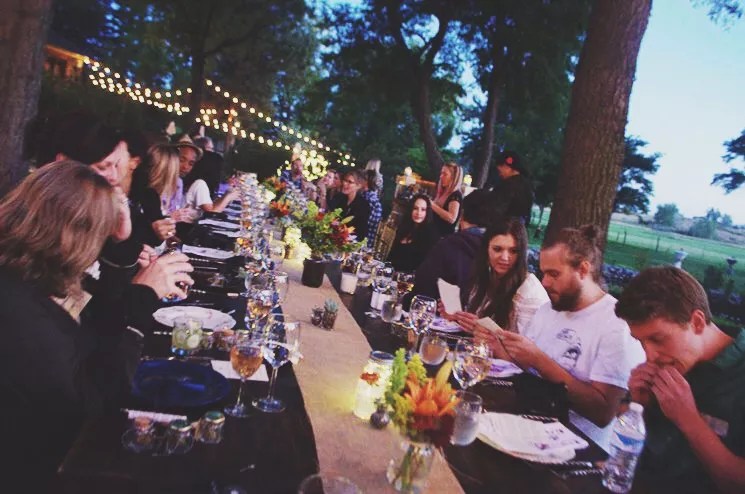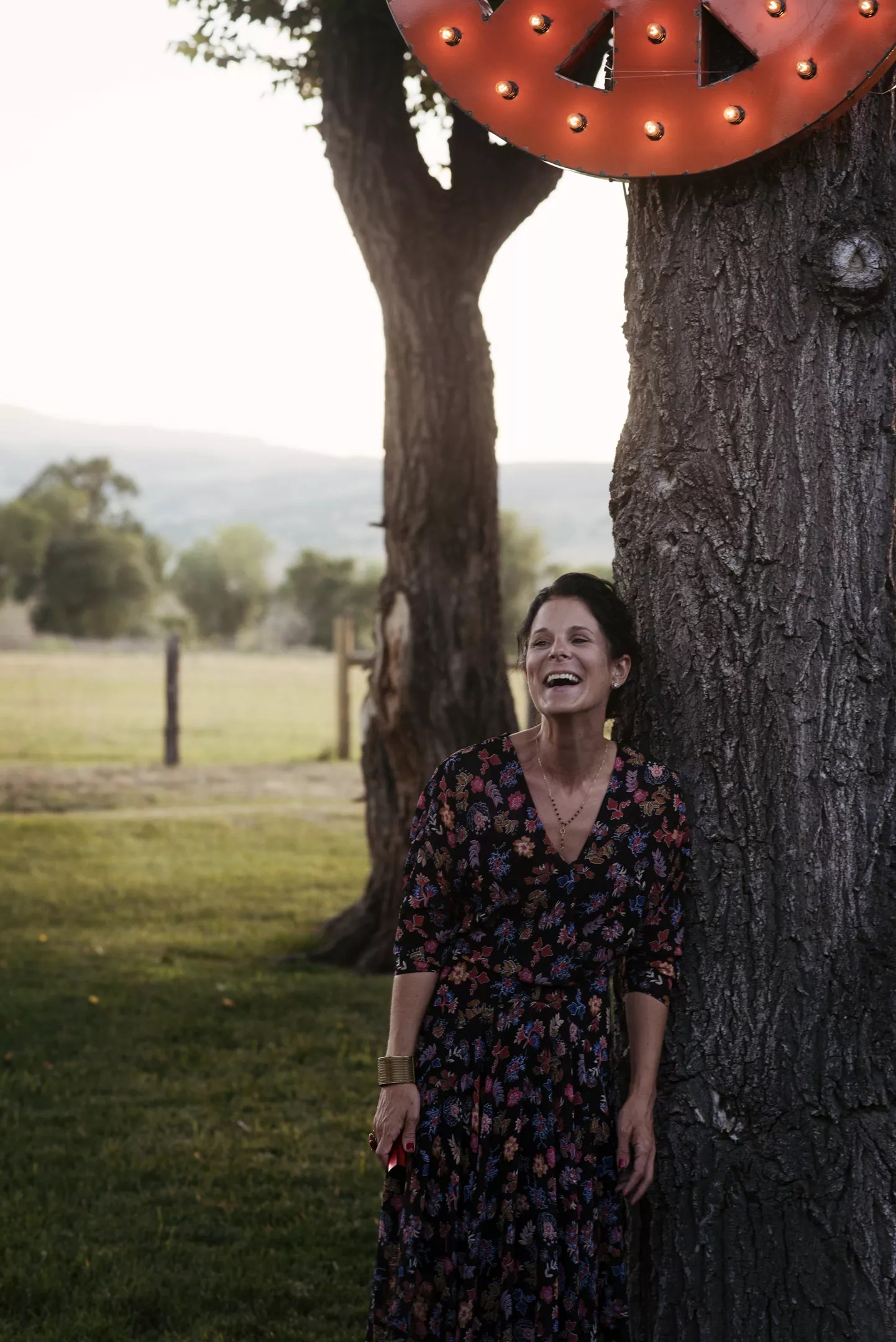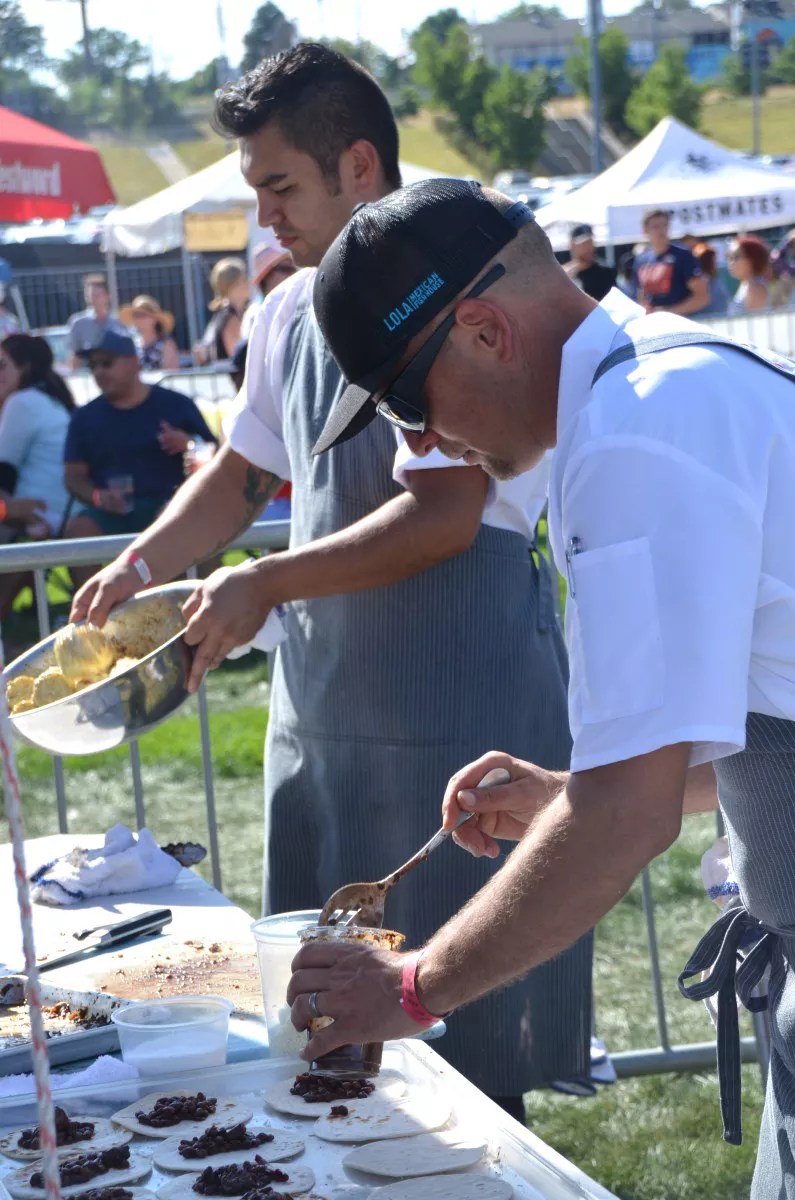
Lindsey Bartlett

Audio By Carbonatix
Our calendar is getting loaded for 4/20. Alongside more now-traditional events, such as the 420 Rally at Civic Center Park and Snoop Dogg’s annual Wellness Retreat show, there are some new ones on the roster, including a spring dinner put on by the Mason Jar Event Group, its first in the Mile High City.
Mason Jar is the “high society” organizer of the most coveted cannabis pairing dinners around. Think sun-soaked tables where Top Chef-worthy food is passed around along with joints, bongs and vaporizers; where the cannabis-industry elite, who appear the exact opposite of stoner stereotypes, thrive inside their own bubble.
Kendal Norris, founder and mastermind behind the dinner series, says she’s thrilled to bring the event to Denver for the first time. She will be joined by chef Jamey Fader of Big Red F fame, who appreciates cannabis with the same intensity as he does the tequila in Lola’s vast collection. Still, presenting cannabis companies will have no problem holding their own with Fader’s bold flavors; the roster includes Lightshade dispensary, Craft710 concentrates and third-time sponsors Stashbox, based out of Denver’s WeWorks office. The evening will also feature music by the Francisco Marques Trio, comprising members of Denver Brazilian band Ginga. While tickets are sold out for this event, summer dinner tickets are available; it’s set for July 13.
Norris was coming right off a piece in the New York Post when we sat down to talk with her, as well as Shannon Brooks and manager John Suddeth of Lightshade, and Stashbox’s Natasha Irizarry. Our conversation ranged from this 4/20 spring dinner to what the terpene profile of cannabis means to the culinary world, giving back to the community and creating social-consumption spaces before social consumption was allowed.
Westword: Are you excited to host your first event in the city?
Kendal Norris: Yes, I am. I’m super-stoked to be having it in Denver. I’m happy to be partnering with Space Gallery. It’s set up perfectly for an event like this. You have this gorgeous outdoor space, and then the art. I think this dinner will be very consumer-heavy, because people are just looking for an opportunity to come out and celebrate the holiday. For the demographic that’s become interested in what we’re doing, there’s nothing else out there for them. It’s the influencers, owners, industry types – the great thing about taking an investor, a non-traditional cannabis investor, is changing their mind. I think it’s such a great access point for newbies.
Natasha Irizarry: It’s great to take business associates…. I brought our investor to the last event, and he’s not a heavy consumer; he’s new to it. This is a way to bring him and to ease him into the industry. When he was able to see this side of things, it became approachable. It felt like a home dinner. Like a Sunday dinner.
Have you been wanting to host a dinner on the 4/20 holiday?
Norris: Last year, I think it was because of the displacement of the [Cannabis] Cup, I had so many calls from consumers, from businesses, asking, “What can we do?” I just sort of threw it out there, and the response was huge, like yes – do it.
How did it feel to be featured recently in the New York Post?
Norris: That’s always great and fun. I struggle with the media sometimes, because I really want them to be engaged in how it happens, but the how-it-happens piece is something press outlets miss a lot. I want people to see the alignment with this dinner and a sort of normalization and accessibility to cannabis.
How do you feel about Initiative 300? What will this change do for Mason Jar Event Group? What doors will it open?
Norris: I think it’s a great start. Just like anything with cannabis, the initial conversation is huge. It’s such an incredible start, and I think with people working together, with the brilliance of Kayvan and his mission, it could work. I’m hesitant, but I think what they’ve done is so amazing, and it’s radical, and again, it’s obvious. Initially, I was not super-excited about this, because I was afraid it would be more of a negative spotlight than a help. This is the first iteration of this law, so it’s far from finished, but the fact that we’re talking about it is a step forward.

Mason Jar Event Group founder Kendal Norris.
Photo courtesy of Mason Jar Event Group
You’ve been ahead of the curve, as you have been throwing these private-consumption parties for almost two years now; the legislation is trying to catch up. Do you think Mason Jar has helped in any way to push this normalization of cannabis forward?
Irizarry: I do. Normalization is a big part of it. Like I was saying, it’s just like a Sunday dinner. It’s subtle. Last time, we were sponsors in fall and winter, as well, and the art really stayed true to the experience – the overall feeling of comfort, good vibes. This industry is able to weed out the bad companies. You can’t sustain shitty. If they’re not constantly trying to get better, to innovate, they fall behind. The point at the end of the day is not about Kendal or me or anybody; it’s about the people who are going to the event. It’s up to us.
How do you feel the Stashbox brand fits into this “high society” lifestyle that Norris’s dinners cultivate?
Irizarry: I’ve been to my first one as a guest and loved it. I told [Kendal] when we first met, “As soon as you’re having one in Denver, let us know.” And even though it was a decent drive to Boulder or Longmont, it was always so worthwhile. We did a little survey at the event and paired people with products right there. This time, we asked people their age, how they choose to consume, what their experience had been, had they been to a Mason Jar event. A CBD bath bomb, hemp-based, and the lip balm were in all of them. I love that lip balm. Elevate wooden joint tips was another popular item.
Who’s cooking this time around?
Norris: Jamey from Lola. So the meal is going to be Mexican themed; one of the featured dishes will be a Verlaso salmon crudo with grapefruit, pickled mustard seeds and salt-cured cactus pairing with Lavender Jones. Jamey Fader has been with Big Red F for twenty years. So you can imagine how much fun it is to try things with him. He just is very easily inspired. And his palate is so advanced, he immediately makes the connection, understands the culture and understands the energetics behind these strains.
So how did you settle on the strains to pair this time around?
Norris: The weed leads everything. To know what menu items we’re going to pair, we have to know what products we’re going to be using. Jamey and I will chit-chat and get stoned. Whatever we have. Usually, we’ll taste things like the concentrates, the strains and then build on top of that flavor profile.
Shannon Brooks: They will be White Dawg and Lavender Jones. I’ll let John speak to them.
John Sudderth: The reason I suggested them is because they’re two of our most popular strains. White Dawg is fairly new to us; it’s high in THC, it tests at 28 to 29 percent. I feel like our customers love the nose on it, love the flavor profiles. The second strain will be Lavender Jones. I think people just really love Lavender Jones; it’s fun in its purple aesthetic, it has floral hints, it’ll be great. I think Lavender is more easy to pair with food. As an intermezzo, it’s great to use to cleanse your palate. In terms of a culinary use, terpenes are the main component of marijuana that gives it a unique smell and taste. There are twelve specific ones that make that strain specific to itself. That’s why we can pair it with food, beverages, anything. The Lavender Jones is very high in linalool. That’s why it’s called Lavender Jones. It’s very purple, sometimes more subtle than others, but our specific strain has deep hues of purple. It’s a little more floral. Purple Erkle x Casey Jones is Lavender Jones. I am a weed snob. Lavender Jones, like I said, is very high in linalool content. It’s very aromatic.
Sudderth: The White Dawg is more of a crowd-pleaser. The highest it’s tested is at 31 percent. White Dawg is Chem Dawg x The White, so that speaks more to people who are used to the OGs. You’ve heard people speak of the closest modern variant of the classic OG strain. It’s very earthy, it’s a lot heavier. So they’re both hybrids, but the energetics are so different. I think it’ll be a great way to highlight hybrids. Lavender is an indica-dominant strain, White Dawg is more of a sativa-dominant strain. There still is a debate about the effects of each. It really depends on the person. The terpene profile of the plant has a lot to do with it. You can really delve into that part of it. Same strain, same genetics, two different people will be affected not the same way. That has a lot to do with realizing it’s because of the terpene profile. Limonene is prevalent in the White Dawg, so it’s really the limonene giving you that flavor.

Chef Jamey Fader of Lola.
Danielle Lirette
Do you take extra steps to prepare for April 20?
Brooks: We do. It’s busy…. Right now, we’re making a conscious effort to stack up inventory. We have a wide variety of strains. We pull together the specials – make sure we have staff, pray that nobody gets sick.
Tell me about Lightshade’s expansions into new neighborhoods?
Brooks: This summer, we will be opening stores in Federal Heights [Federal and 92nd] and Lowry [Dayton and Alameda]. So we’re working with Kind Colorado to have them vet nonprofits for us to work with, but to also learn how to cross the gap in the communities that we’re going into, like the community in Federal Heights. They say they really need somebody Spanish-speaking to speak to these communities because they’re really fearful that cannabis will get into the hands of minors, when in fact legalizing has the opposite effect. We want to educate, and we also want to let them know that we want to partner with them, because we don’t want it to get into the hands of minors, either. We do our best to make sure there’s no diversion, which is like shoulder-tapping – where somebody who is over 21 buys it and then passes it off to a minor. We make sure that that’s not happening. So we need to get face to face with them and clear this misconception. The only way that happens is at a grassroots level. We want them to know, “We hear you, we care, we are doing everything we can to make sure this isn’t in the community.” It takes away the black market.
What’s the exact philanthropic plan in that neighborhood?
Brooks: In Federal Heights, Lightshade is fully funding a food bank in that community that feeds 1,500. We’re partnering with local organizations to help people understand that we’re not evil and that we’re abiding by the laws and rules. Come talk to us if there’s a problem; we’re your neighbors or your partners in this community. Anytime you send in an application, anybody in the cannabis industry has to have a community engagement plan. Next year, you’ll have to report on your progress on that plan.
Does the cannabis community take care of one another?
Irizarry: Taking care of each other in general is a part of cannabis. The thing that I like about this industry the most is that all of us have, at one point in our lives, had to deal with the black market. It changes everything because of accountability, trust, ethics; those things become more of a spotlight. I’m from North Carolina. And people are talking about it, asking me, “Do you want to move back and start a dispensary or company there?” I replied, “No way – not at the beginning.” The ethical companies are willing to put the customer experience ahead of their own needs. The risk is huge.
Does this ethical community responsibility kind of cross over into every cannabis company you work with?
Norris: I love working with companies that are doing well by doing good. They’re just this new economy; marijuana in itself is part of the new economy. I am inspired by the idea of doing well by doing good.
Brooks: I think you have a responsibility as a business owner in the community to elevate the community. Our staff is so young. In general, they don’t have to go out and seek a volunteer opportunity; we can give them a sense of involvement giving back within our framework. We really take pride in the community.